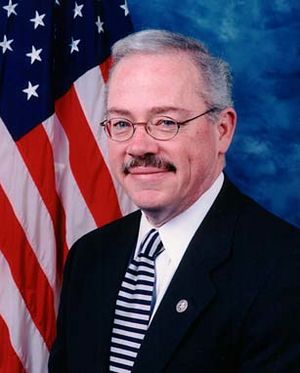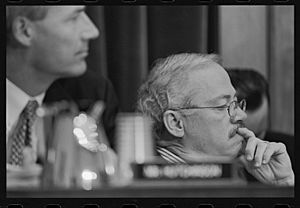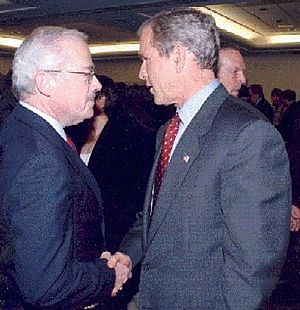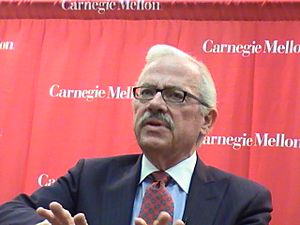Bob Barr facts for kids
Quick facts for kids
Bob Barr
|
|
|---|---|
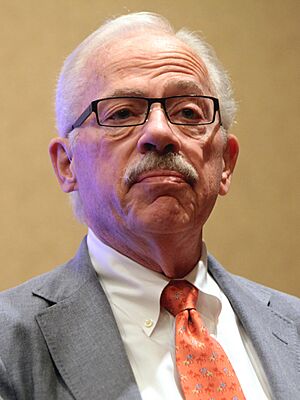
Barr in 2016
|
|
| 68th President of the National Rifle Association | |
| In office May 21, 2024 – May 2025 |
|
| Preceded by | Charles L. Cotton |
| Succeeded by | Bill Bachenberg |
| Member of the U.S. House of Representatives from Georgia's 7th district |
|
| In office January 3, 1995 – January 3, 2003 |
|
| Preceded by | Buddy Darden |
| Succeeded by | John Linder |
| United States Attorney for the Northern District of Georgia | |
| In office 1986–1990 |
|
| Appointed by | Ronald Reagan |
| Preceded by | Larry Thompson |
| Succeeded by | Joe Whitley |
| Personal details | |
| Born |
Robert Laurence Barr Jr.
November 5, 1948 Iowa City, Iowa, U.S. |
| Political party | Republican (1970–2004, 2011–present) |
| Other political affiliations |
Independent (2004–2006) Libertarian (2006–2011) |
| Spouses |
Gail Barr
(m. 1976; div. 1986)Jeri Dobbin
(m. 1986) |
| Children | 4 |
| Education | University of Southern California (BA) George Washington University (MA) Georgetown University (JD) |
Robert Laurence Barr Jr. (born November 5, 1948) is an American lawyer and politician. He was the president of the National Rifle Association (NRA) from 2024 to 2025. Before that, he worked as a federal prosecutor. He also served as a U.S. Representative for Georgia's 7th congressional district. He was a Republican from 1995 to 2003.
Barr became well-known as a leader in the effort to impeach President Bill Clinton. During his time in Congress, he wrote the Defense of Marriage Act. This law was later changed by the Supreme Court and then officially ended by Congress.
In 2006, Barr joined the Libertarian Party. He was their candidate for President of the United States in the 2008 election. He returned to the Republican Party in 2011. He tried to win a Congressional seat again in 2014 but was not successful.
Contents
Early Life and Education
Barr was born in Iowa City, Iowa. His father was a military officer who traveled a lot for his job. Because of this, Bob Jr. lived in many different countries as a child. These included Malaysia, Pakistan, Panama, Peru, Baghdad, and Tehran, Iran. He finished high school in Tehran in 1966.
He came back to the United States for college. He went to the University of Southern California (USC). There, he joined the Tau Kappa Epsilon fraternity. He later became a leader for the fraternity from 2013 to 2015.
While at USC, Barr became interested in conservative ideas. He joined the Young Trojan Republican Club. He earned his bachelor's degree from USC in 1970.
Starting His Career
Barr continued his education, earning a master's degree in International Affairs from George Washington University in 1972. He then earned his law degree from Georgetown University Law Center in 1977. From 1971 to 1978, Barr worked for the Central Intelligence Agency (CIA). He was an analyst focusing on Latin American issues.
After leaving the CIA, Barr moved to northern Georgia. He worked as a lawyer and became active in the Republican Party. He even served as a county leader. In 1984, he tried to get elected to the Georgia House of Representatives but was not successful.
In 1986, President Ronald Reagan appointed Barr to be the U.S. Attorney for the Northern District of Georgia. He held this job until 1990. His office worked on cases against state and local officials. From 1990 to 1991, Barr was president of the Southeastern Legal Foundation. This group works to support "limited government" and "economic freedom."
Congressional Career
In 1994, Barr was elected to the U.S. House of Representatives as a Republican. He represented Georgia's 7th congressional district. This election was part of the "Republican Revolution." It was when Republicans gained control of the House for the first time in 40 years.
Barr was re-elected three times, serving from 1995 to 2003. In Congress, he was a senior member of the Judiciary Committee. He also served on other important committees.
Barr became known for his serious image. He once said, "You don't send me to Washington to smile." He believed that what matters is how politicians use taxpayer money, not whether they smile.
Before the 2002 elections, Georgia's voting districts were changed. Barr's district was redrawn to include more Democratic voters. This made it harder for him to win. He lost his re-election bid in 2002.
Political Views in Congress
During his time in Congress, Barr was considered one of the most conservative members. However, he also spoke out against some policies of the Bush administration. He was concerned about privacy and civil liberties after the September 11 attacks. This made him stand out among other Republicans.
Gun Rights
Barr strongly supports the right to own guns. He has always been against efforts to limit gun ownership.
Drug Policy
Barr was initially a strong supporter of the "War on Drugs." He believed in strict federal laws against drugs.
..... He worked to overturn the very amendment he had created. .....
Marriage Laws
Barr played a key role in debates about same-sex marriage. He wrote the Defense of Marriage Act (DOMA) in 1996. This law said that only marriages between a man and a woman could be recognized by the federal government. It also allowed states to choose not to recognize same-sex marriages from other states.
Later, Barr apologized for the part of DOMA that prevented federal recognition of same-sex marriages. He now supports same-sex marriage. He also opposed a federal amendment that would have banned same-sex marriage, saying it violated states' rights.
Terrorism and Privacy
Barr voted for the first USA PATRIOT Act. This law was passed after the 9/11 attacks to help fight terrorism. However, he made sure that the bill included "sunset clauses." These clauses meant that parts of the law would expire after a certain time unless renewed. He has since said he regrets his vote for the Patriot Act.
Economic Views
Barr believes in reducing government spending and getting rid of "corporate welfare." He also supports changing the tax system.
Role in Clinton Impeachment
Barr is well-known for his role in the impeachment trial of President Bill Clinton. In 1997, Barr introduced a resolution asking the House Judiciary Committee to start an impeachment investigation against Clinton. This was before the Monica Lewinsky scandal became public. Barr argued that Clinton had been acting outside the law.
After the Lewinsky scandal, Barr was the first lawmaker to call for Clinton's resignation. He often appeared on television to discuss the impeachment. During the impeachment debate, Barr argued that Clinton's actions threatened the Constitution.
Political Associations and Activities
Barr was on the board of directors for the National Rifle Association of America from 2001 to 2007. He became president of the NRA in May 2024.
He is also a commentator on political issues. He chairs the '21st Century Center for Privacy and Freedom' for the American Conservative Union Foundation.
Libertarian Party Involvement
In December 2006, Barr became a regional representative for the Libertarian National Committee. He stated, "I'm happy to announce that I am now a proud, card-carrying Libertarian." He said he was committed to helping elect leaders who support smaller government, lower taxes, and individual freedom.
American Freedom Agenda
Barr is one of the four founders of the American Freedom Agenda. This group works to restore checks and balances and protect civil liberties. They have a "Freedom Pledge" for presidential candidates.
Other Activities
In early 2008, Barr became a professor at Kennesaw State University. He taught a course on privacy rights.
Barr appeared in the movie Borat: Cultural Learnings of America for Make Benefit Glorious Nation of Kazakhstan. In his scene, he met with the character "Borat Sagdiyev" in the United States Capitol.
Barr has also written a book called The Meaning of Is: The Squandered Impeachment and Wasted Legacy of William Jefferson Clinton. He has hosted a political talk radio show and writes columns for newspapers.
2008 Presidential Campaign
In early 2008, there were rumors that Barr might run for president as a Libertarian. He later confirmed his interest. He officially announced his candidacy for the Libertarian nomination on May 12, just before their convention.
On May 25, 2008, Barr became the 2008 Libertarian presidential nominee. He won after six rounds of voting at the Libertarian convention. He beat Mary Ruwart in the final round. Reason magazine called Barr "the first serious candidate the LP has run."
Barr invited the Republican and Democratic presidential candidates, John McCain and Barack Obama, to weekly debates. Many people thought Barr might take votes away from McCain. However, Barr said that small-government Republicans would not vote for McCain anyway.
Barr was on the ballot in 45 states. He even filed a lawsuit against Oklahoma because he felt their ballot access laws were too strict. Polls showed that many voters wanted Barr to be included in the presidential debates.
On November 4, 2008, Barr received 523,686 votes, which was 0.4% of the national vote.
Return to Republican Party
After his presidential campaign, Barr announced his return to the Republican Party in December 2011. He stated that the country needed new leadership and strong Republican majorities in Congress.
2014 Congressional Campaign
On March 28, 2013, Barr announced he would run for his old congressional seat, the 11th District. The seat was open because the current representative was running for the Senate. Barr placed second in the primary election. Since no candidate won more than 50% of the vote, a runoff election was held. Barr lost the runoff election by a significant margin.
NRA Career
On May 20, 2024, Bob Barr was elected by the National Rifle Association Board of Directors as the NRA President. He served in this role until May 2025.
See also
 In Spanish: Bob Barr para niños
In Spanish: Bob Barr para niños
 | Audre Lorde |
 | John Berry Meachum |
 | Ferdinand Lee Barnett |


